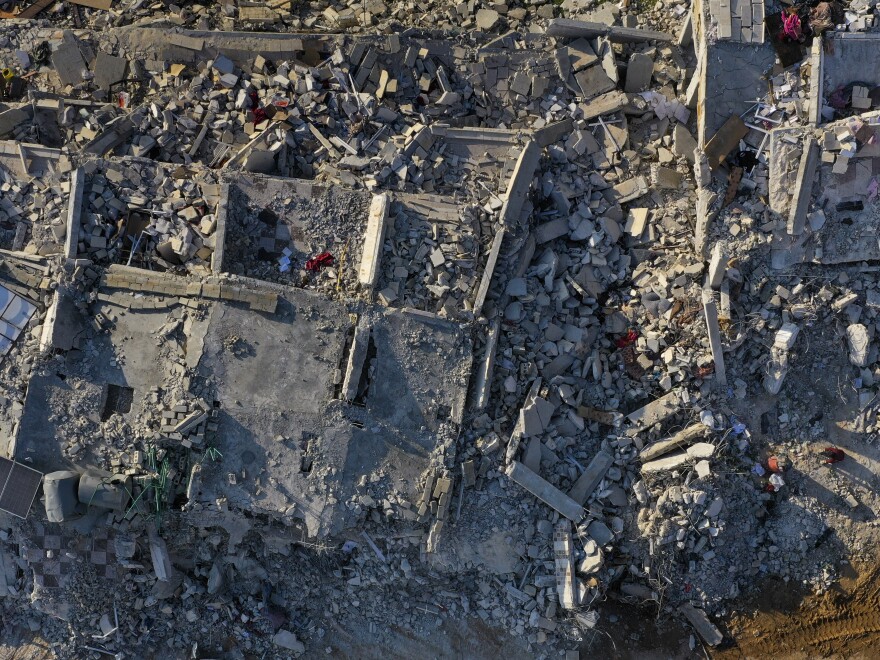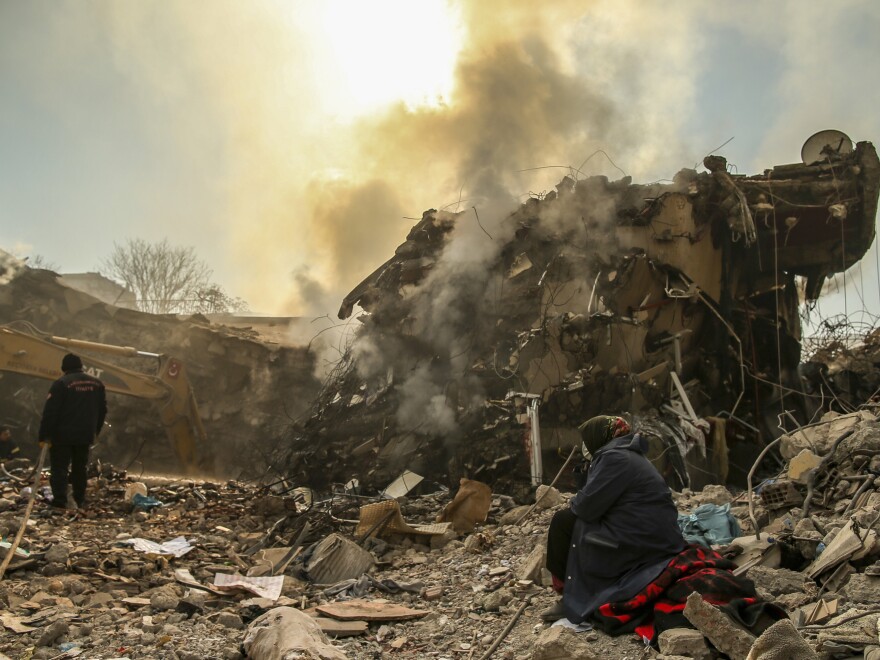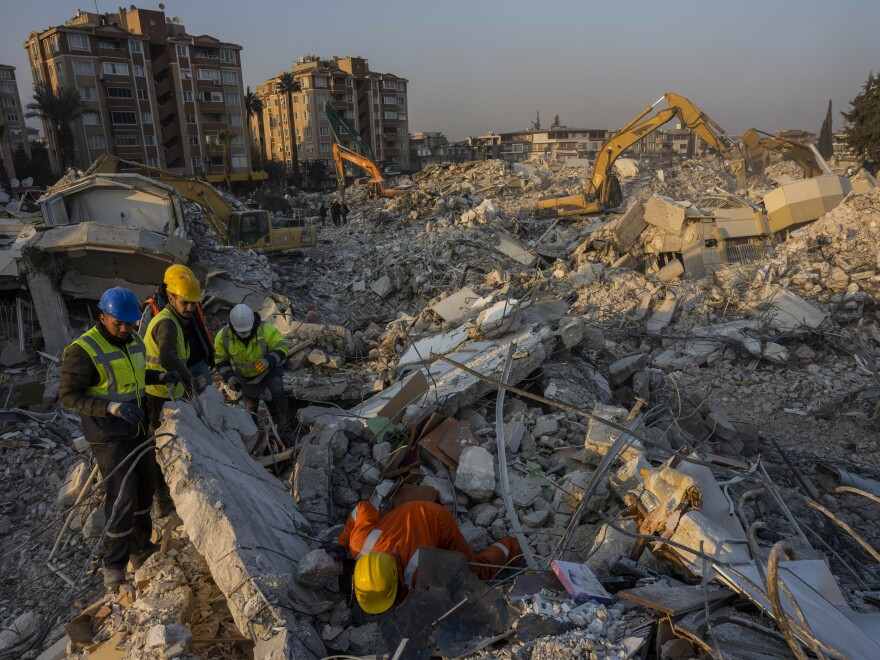In the immediate aftermath of a devastating earthquake, where someone is trapped in their collapsed home or office building and waiting for help, it's likely that the first people to help won't be trained professionals.
"The people who are going to have the most effect on the rescue is going to be your neighbors. Because they're the ones right there, right when it happens," Forrest Lanning told NPR. He's an earthquake and volcano response liaison with the Federal Emergency Management Agency and a structural engineer.
Lanning and other emergency and disaster response experts say that no matter the area around the world hit by an earthquake or other kind of emergency, people should know that effective help often comes from the immediate community.
It's one of many lessons experts take from studying disasters like the 7.8 magnitude earthquake that decimated large areas in Turkey and Syria.
Spreading that awareness, and training people to respond when official rescuers aren't able to do so, are among the measures emergency response experts say are essential to saving the most lives in the immediate aftermath of a disaster.
"Events like this are, of course, absolutely devastating, but they remind us of the importance of scientific research and putting that research into practice through building codes and retrofitting [infrastructure], enforcing policy and things like sharing knowledge to establish best practices," Lindsay Davis, the earthquake disaster assistance team manager at the U.S. Geological Survey, told NPR.

There are usually not enough search and rescue crews to save everyone
Experts say the growing death tolls — more than 39,000 in Turkey and Syria — reflect how important search and rescue efforts are within the first 12 hours to two days.
The window of opportunity to save people trapped under collapsed buildings "will start to close pretty fast and by the time you get around day four or five, it's done," Lanning said.
Even if a bystander can't pull someone out of the rubble, they can still pinpoint for responders areas where people were located, said Natalie Simpson, the professor and chair of operations management and strategy at the University at Buffalo School of Management.
Response efforts will be prioritized in locations where bystanders have already found people alive, she said.
"It takes a long time at each building, to have to listen and carefully remove pieces of the building debris to get to people," Lanning said. And with the scene in Turkey "there's thousands and thousands of these buildings," he added.
This is made even more important by the fact that international teams take 24 to 48 hours to arrive, Lanning said. Generally, there are nowhere nearly enough local search and rescue teams on the ground to respond to each collapsed building.
This was the case in Samandağ in Turkey where civilians were digging through rubble in an attempt to save family and friends following the earthquake. After several hours, a small group of rescuers arrived and they were stretched thin, The Guardian reported.
Knowing the importance of quick, local aid, the Community Emergency Response Team was developed in the U.S. It's a FEMA program that trains volunteers across all 50 states with basic disaster response skills.
It teaches people what to do after a major earthquake, where to get water after an emergency, how to check on immobile neighbors, and how to search collapsed buildings, Lanning said.
There are factors, like types of injuries and how many search and rescue teams are on the scene, that contribute to how likely a trapped person is to survive. He noted that if a trapped individual is uninjured or has minor injuries, they can last up to a week under a collapsed building.
And miracles do happen. Reuters reported Tuesday that seven survivors were rescued from the rubble in Turkey more than a week after the initial earthquake.
Deploy the military immediately
Simpson with the University at Buffalo said she wishes each time disaster strikes there would be an immediate mobilization of rescue crews and military. That's not always the case, and it wasn't in Turkey and Syria, she said.
The Turkish government has come under criticism for its response. President Recep Tayyip Erdoğan has admitted "the first day we had some discomforts," but had insisted by the second and third days "the situation got under control."

"The single, biggest failure point in emergency response is failure to pick up on the fact that this is an emergency," Simpson said. The instinct is to wait to get more information.
"With emergencies, all of them, including the aftermath of an earthquake, you're not in Kansas anymore," she said. "These are not normal conditions and so one of the traps that we fall into is, 'Oh God, what's the best thing to do at this moment?' Stop it with 'best.' It's all good. Let's get moving."
In many areas around the world, including Turkey, the military is best equipped to operate in a disaster-transformed landscape and to open airstrips to get aid in quickly, she said.
But the Turkish government failed to immediately mobilize its military to aid in the direct rescue efforts or to establish those all-important field hospitals and airstrips, according to an analysis published by the Middle East Institute, a nonprofit think tank.
Turkey is an earthquake-prone region and will always be susceptible to massive devastation, Simpson said.
"There's a very important lesson here: It's never too early to activate your large-scale response when you're not getting any information out of a region," she said. "I think that that will make an impression on decision-makers elsewhere, that will actually help people in the future."
Simpson said this is also a reminder to: "Activate your military, immediately. The sooner that you get going on that, the better off you'll be."
Mitigation and prevention are critical to avoiding future disaster

"While search and rescue operations are critical, research is very clear that mitigation and prevention are the most effective when it comes to minimizing disaster losses," Davis with the U.S. Geological Survey said.
What is lost when the work isn't done to cut risks to homes and civilians in earthquake-prone regions has been made clear in Turkey.
Lanning said this latest disaster hammers home how important it is for global communities in earthquake-prone areas to strengthen infrastructure to withstand a disaster like the one in Turkey and Syria.
Major earthquakes that struck Turkey in 1999 and 2011 served as two important lessons to officials that the country's building construction needed to be retrofitted to combat future disasters.
"A lot of the damage there is because of the type of construction and type of buildings," which is mostly concrete, said Lanning, who has worked for 15 years in various earthquake-prone areas of the world.
This is despite the knowledge that concrete buildings are not the best at withstanding earthquakes. They are very easy to construct and can easily hide imperfections, he said.
Much of the work to analyze this latest disaster and what went wrong or right will come in the following months and years. But it's incredibly valuable work, Lanning said.
"Having earthquakes makes us more prepared. It makes us better prepared and more resilient," he said.
Copyright 2023 NPR. To see more, visit https://www.npr.org.





